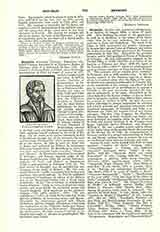

Reuchlin (Grecized, CAPNION), JOHANNES, celebrated German humanist, b. at Pforzheim, Baden, 22February, 1455; d. at Liebenzell, June 30, 1522. He studied at Freiburg, Paris, and Basle, where he won his baccalaureate in 1475, his degree of master in 1477, and later taught Greek and Latin; in 1479 he became bachelor of jurisprudence at Oreans, and licentiate of law at Poitiers in 1481. During two trips to Italy (1482 and 1490) he became acquainted with the Platonic Academy at Florence and the. chief Italian philologians, he himself exciting wonder through his great philological knowledge. In the interval between these journeys he became counsel of Count Eberhard of Württemberg, assessor in the high court and doctor of jurisprudence, meanwhile applying himself zealously to the study of Hebrew. On the death of his patron Eberhard, he fled to Heidelberg through fear of his successor, the malevolent Count Eberhard VI, where he became counsel to the elector. In 1498 he paid his third visit to Rome, and perfected his Hebrew by intercourse with some learned Jews. In Heidelberg he wrote his two witty and successful Latin comedies, “Sergius” and “Henn”. On Eberhard’s deposition he returned to Stuttgart, and became imperial judge of the Swabian Confederation (1502-12), private litterateur, professor of Greek and Hebrew at Ingoldstadt (1520-1), and professor at Tubingen (1521-2). The chief service of Reuchlin was his introduction into Germany of the study of Hebrew. His “De rudimentis hebraicis” (1506), containing both lexicon and grammar, was epoch-making. In 1512 he published as a manual for beginners an edition of the Hebrew text of the Penitential Psalms with a literal Latin translation. In his “De accentibus et orthographia linguae hebraicm” (1518), he treats in detail the word-accent, and more briefly the rhetorical accent and musical emphasis. Less important are his cabalistic writings (“De verbo mirifico”, 1494; “De arte cabbalistica”, 1517), in which he becomes lost in the abstruse problems of mysterious names and figures. Meanwhile his unfortunate quarrel with Johann Pfefferkorn and the Cologne Dominicans concerning the destruction of the Talmudic books had begun. (For a discussion of this, see Humanism.) Throughout the Reformation, Reuchlin remained faithful to the Church and sought to alienate his grandnephew Melanchthon from Luther.
KLEMENS LÖFFLER

